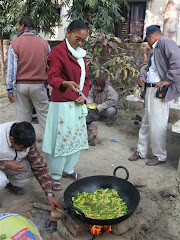Cold and busy week in Kathmandu, preparing, delivering and evaluating VSO’s first action research workshop, with ‘selected’ volunteers and partners from all programme areas. Eastern Terai leads the way, with Joseph, Etienne and me all committed to projects. Pleasant evenings with friends and good food.
A new Nepali magazine, Shikshak (Teacher) appeared on the news stands this week. Imagine our shock at seeing our photograph on the front cover, and a double page spread inside with photographs of us at home and on our bicycles plus a feature article (in Nepali). VSO tells us its very flattering and almost accurate. Worse was to come when we discovered another photograph and an article with several misquotes in the Nepali Times, a quality English language weekly. Its also on the internet!
Inevitable foggy morning delay at the airport on Friday, but arrived home in time to do shopping in the heavily policed streets. Mass rallies organised by all political parties scheduled for Saturday, following announcement of April 10 as election date – the third since we have been here. Our neighbours are pleased to see us home, as they can now get into the garden to cut grass for their animals. Unfortunately the tiny children like using our path as a toilet.
Gloom settled over the Terai on Monday, with thick fog, drizzle, cold wind and escalation of Madhesi ‘agitation’; schools closed on Tuesday and Wednesday – and Thursday and Friday too at Bokhari; road blocks of burning tyres, air full of acrid smoke. The only bright spot on my ride to work was the goat on the corner wearing a pink cardigan.
Drama on Tuesday; after a wasted journey through the burning tyres to Shankapur, I returned to the ETC, where Pandit, a Hindu priest, had arrived to teach Nepali. White priest’s robes, white ‘shell’ jacket, white socks and trainers, 3 white hats – baseball cap, bobble hat and motorcycle helmet, worn simultaneously. David phoned at 11:45 from Bokhari as the man from the tea stall had just burst into school to announce that GP Koirala, the prime minister, had died. We turned on the radio to hear his doctor reporting an improvement in his condition. Spent most of the rest of the day listening to the radio with more news of improving PM and deteriorating security in the Terai, drinking tea and tin beakers of warm water, speculating about what might happen. Durga says as Koirala is 84, it is time ‘he went up’. There is no natural successor, but his daughter, an ardent royalist, is poised to take over.
Wednesday was really cold, with day time temperatures plummeting to 16oC! Female footwear sets new trends. Most are content with flesh coloured socks and sandals, but Ramita is proud of her sky blue high heeled mules with diamante trim worn with black ankle socks.
On Thursday Bokhari was still closed, but Shankapur had opened with about 30% attendance. Trainee teachers from Koshi Campus (school leavers from a private college, looking younger than many of the grade 5 students) had also arrived, but inspite of 18 trainees, most of the regular staff and minimal number of children, some classes remained untaught. Most of the ETC trainees were busy preparing materials that have little relevance to teaching and learning for an exhibition. I saw Indra teach Nepali to grade 3 with some hyperactive boys and great excitement when a black lamb joined the class. At last she started to involve the girls, and Sanjit held up little Nirmaula so she could write on the blackboard. School uniform has disappeared under layers of jumpers for the children who have them. Puja, my special tiny friend from grade 4, has socks but no shoes and a piece of wire through her nose to keep her piercing from closing. Later I went to see the trainees at Hat Khola, but attendance was even poorer so they closed the school and I resisted Nila’s invitation home to sample her radish pickle.
Friday was a ‘special event’ at Shankapur to mark the end of school-based training. Panya introduced it as an international sports day when I arrived. Lots of fun, with novelty races for excited children. Umapati, Durga and Kamchha, chair of the School Management Committee and local president of the Congress party arrived for speeches and prize giving. Kamchha looks remarkably like Humphrey Bogart in The African Queen. Raj Narayan pedalled off to the nearest tea stall and came back with tea for all the teachers swinging precariously from his handlebars. Then teachers played ‘break the pot’. A young man from Koshi Campus did break the pot and I won third prize.
.jpg)
.jpg)







.jpg)
.jpg)
.jpg)
















.jpg)



















